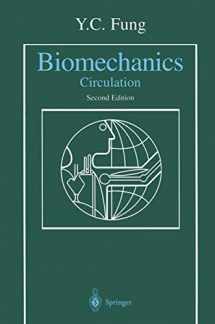
Biomechanics: Circulation
ISBN-13:
9781441928429
ISBN-10:
1441928421
Edition:
Softcover reprint of the original 2nd ed. 1997
Author:
Y. C. Fung
Publication date:
2010
Publisher:
Springer
Format:
Paperback
590 pages
Category:
Bioengineering
,
Engineering
FREE US shipping
Book details
ISBN-13:
9781441928429
ISBN-10:
1441928421
Edition:
Softcover reprint of the original 2nd ed. 1997
Author:
Y. C. Fung
Publication date:
2010
Publisher:
Springer
Format:
Paperback
590 pages
Category:
Bioengineering
,
Engineering
Summary
Biomechanics: Circulation (ISBN-13: 9781441928429 and ISBN-10: 1441928421), written by authors
Y. C. Fung, was published by Springer in 2010.
With an overall rating of 3.6 stars, it's a notable title among other
Bioengineering
(Engineering) books. You can easily purchase or rent Biomechanics: Circulation (Paperback) from BooksRun,
along with many other new and used
Bioengineering
books
and textbooks.
And, if you're looking to sell your copy, our current buyback offer is $0.3.
Description
The theory of blood circulation is the oldest and most advanced branch of biomechanics, with roots extending back to Huangti and Aristotle, and with contributions from Galileo, Santori, Descartes, Borelli, Harvey, Euler, Hales, Poiseuille, Helmholtz, and many others. It represents a major part of humanity's concept of itself. This book presents selected topics of this great body of ideas from a historical perspective, binding important experiments together with mathematical threads. The objectives and scope of this book remain the same as in the first edition: to present a treatment of circulatory biomechanics from the stand points of engineering, physiology, and medical science, and to develop the subject through a sequence of problems and examples. The name is changed from Biodynamics: Circulation to Biomechanics: Circulation to unify the book with its sister volumes, Biomechanics: Mechanical Properties of Living Tissues, and Biomechanics: Motion, Flow, Stress, and Growth. The major changes made in the new edition are the following: When the first edition went to press in 1984, the question of residual stress in the heart was raised for the first time, and the lung was the only organ analyzed on the basis of solid morphologic data and constitutive equations. The detailed analysis of blood flow in the lung had been done, but the physiological validation experiments had not yet been completed.


We would LOVE it if you could help us and other readers by reviewing the book
Book review

Congratulations! We have received your book review.
{user}
{createdAt}
by {truncated_author}


